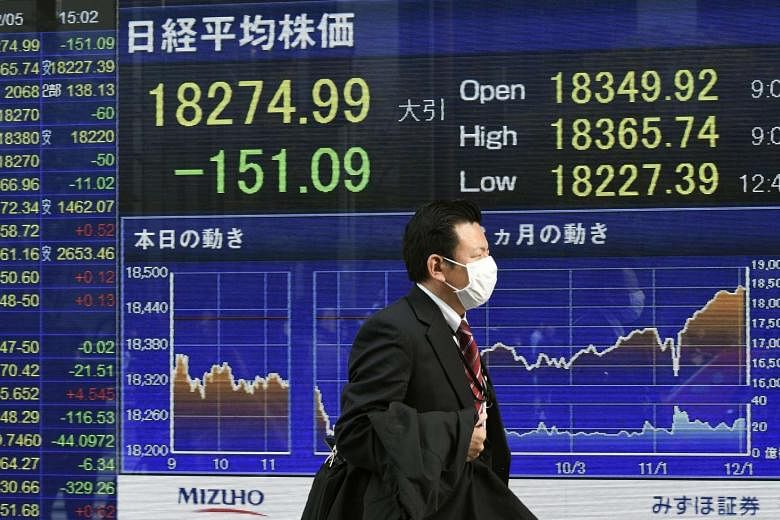TOKYO/SYDNEY (REUTERS) - Asian shares flatlined on Friday (Dec 9), but were on track for robust weekly gains, while the euro caught its breath after sliding when the European Central Bank trimmed the size of its asset purchase programme and also extended it for longer than many had expected.
MSCI's broadest index of Asia-Pacific shares outside Japan wobbled close to the previous session's close in early trading, poised for a weekly gain of 2.2 per cent.
Japan's Nikkei stock index was up 0.6 per cent, an increase of 2.4 per cent for the week in which the dollar gained 0.6 per cent against the yen.
The US dollar was up 0.1 per cent at 114.18 yen.
The euro was licking its wounds at US$1.0615. It had been as high as US$1.0875 before collapsing when markets realised the European Central Bank's (ECB) actions were actually very dovish.
The ECB said it would reduce its monthly asset buys to 60 billion euros (S$90.7 billion) as of April, from the current 80 billion euros, and extend purchases to December from March - three months longer than what some analysts had forecast.
That dragged down two-year yields across Europe and sharply steepened the yield curve, a gift for banks that typically borrow short maturities and lend long.
The promise of lower rates for longer was taken as a green light for carry trades, where investors borrow euros at cheap rates to invest in higher yielding currencies. "This effective and extended easing may make euro a funding currency of choice and so puts euro-crosses in focus," Westpac analyst Tim Riddell said in a note.
ECB President Mario Draghi said the unexpected move was not an outright winding-down of the central bank's quantitative easing (QE) programme, and the central bank reserved the right to increase the size of purchases again if the eurozone economy falters.
The ECB's bond purchase changes came less than a week before the Federal Reserve's policy meeting next Tuesday and Wednesday.
Interest rates futures, implied traders saw a 98 per cent chance the US central bank would raise interest rates by a quarter point next week, and about a 50 per cent chance it would raise rates by at least another quarter point by June 2017, according to CME Group's FedWatch programme.
Despite the impending rate hike, major US stock indexes climbed again on Thursday and set fresh record highs as Wall Street continued its month-long rally following the election of Mr Donald Trump to president.
"We're at a point in time between big announcements from a couple of the big central banks after the ECB, and looking forward to fed next week, so the current momentum underway seems to be the path of least resistance at this point in time," said Mr Bill Northey, chief investment officer of the private client group at US Bank in Helena, Montana.
"We've come a long way, and I wouldn't expect us to keep same pace, but the trajectory might be correct" for dollar strength, he added.
The dollar index, which tracks the greenback against a basket of six major rival currencies, was steady on the day at 101.12, up 0.3 per cent for the week.
Oil rebounded on growing optimism that non-OPEC producers might agree to cut output following a cartel agreement to limit production.
US crude added 0.3 per cent to US$51.01 a barrel.

